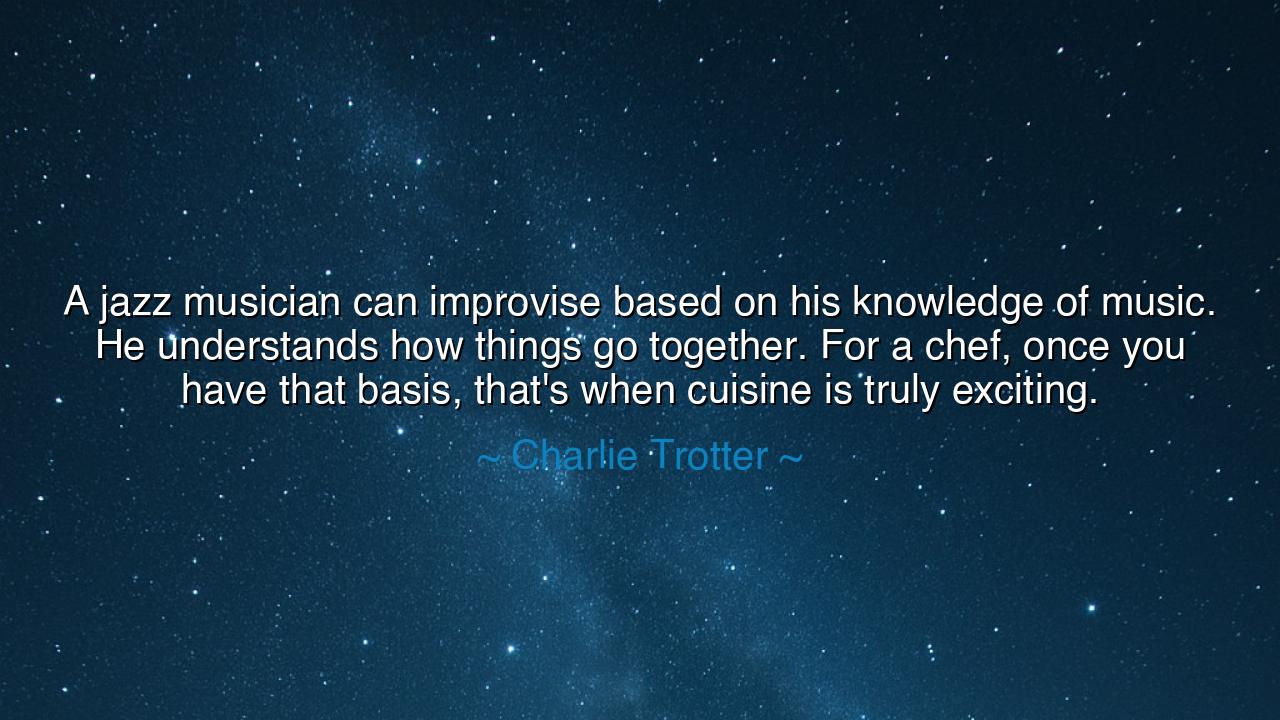
A jazz musician can improvise based on his knowledge of music. He
A jazz musician can improvise based on his knowledge of music. He understands how things go together. For a chef, once you have that basis, that's when cuisine is truly exciting.






“A jazz musician can improvise based on his knowledge of music. He understands how things go together. For a chef, once you have that basis, that's when cuisine is truly exciting.”
Thus spoke Charlie Trotter, the culinary visionary whose kitchens were temples of creativity and precision. In these words, Trotter bridges the world of art and craft — of music and food — to reveal a truth as old as civilization itself: that freedom without knowledge is chaos, and knowledge without creativity is lifeless. He reminds us that mastery is not the absence of rules, but the ability to dance within them; that true innovation arises not from rebellion alone, but from understanding so deep that the artist becomes one with his craft.
In the image of the jazz musician, Trotter evokes the very spirit of spontaneous creation. The musician does not play blindly; every note he bends, every rhythm he shifts, is rooted in years of study, discipline, and devotion. He knows the scales, the harmonies, the pulse of sound — yet he transcends them. His improvisation is not an accident but an act of trust between knowledge and intuition. Likewise, the chef, once he knows his ingredients, his techniques, his flavors — once he feels how heat transforms, how texture sings — can step beyond recipes into the realm of imagination. There, in that sacred moment of creation, cuisine becomes art, and the kitchen becomes a stage for genius.
The origin of Trotter’s wisdom lies in the very evolution of his craft. Born in the world of fine dining, he sought not merely to replicate tradition but to redefine it. He observed that many cooks, like students of music who cling to the notes, become prisoners of instruction. But those who study deeply, who internalize the principles of their art, begin to see patterns where others see limits. For such souls, the recipe is no longer a chain — it is a foundation, a rhythm upon which infinite variations can arise. Trotter’s own cooking was a symphony of innovation, built upon the classical techniques he had mastered, yet daring enough to surprise, challenge, and inspire.
Consider the great Miles Davis, master of jazz, whose trumpet spoke with both discipline and danger. In every performance, Davis walked the line between structure and surrender. He knew the rules so well that he could break them beautifully. His music was born of risk — yet it never dissolved into confusion. He once said, “It’s not the notes you play, it’s the notes you don’t play.” So too is it in cooking, and in life itself. The greatest acts of creation come not from random impulse, but from disciplined freedom — from knowing the essence of one’s art so completely that one can let go, and trust the flow of inspiration.
In this, Trotter reveals a deeper teaching: that mastery and imagination are twins, not enemies. The novice who rushes to create without learning stumbles in confusion, while the scholar who studies endlessly without daring to act withers in sterility. True greatness belongs to those who walk both paths — who humble themselves before knowledge, and then rise to transcend it. The jazz musician practices his scales until his fingers dream them; the chef refines his craft until every sense is awakened. Then, and only then, can either become free.
Yet Trotter’s wisdom extends beyond music and cuisine — it speaks to every art, every labor, every life. The engineer who truly understands the laws of motion can invent what no textbook describes. The writer who knows the rhythm of language can shape words that seem to breathe. Even the parent, who learns through patience and love, can guide a child not by control, but by understanding. Knowledge gives form; creativity gives life. Together they make the world not only functional, but beautiful.
Therefore, O seeker of mastery, take this teaching into your heart: learn deeply before you leap freely. Study your craft until its rules live within you; practice until instinct and intellect become one. Then, when the time comes to create — whether in art, work, or living — trust the song that arises from within. Let your hands move with both memory and daring. For as Charlie Trotter teaches, the highest joy of creation comes when the discipline of the mind joins the freedom of the soul — when knowledge and imagination, like jazz and cuisine, unite in perfect harmony.
So walk your path as the master does — with patience, humility, and wonder. Build your foundation of knowledge, and then let it lift you beyond boundaries. For when you truly understand how things “go together,” every act — whether cooking a meal, composing a melody, or living a life — becomes a work of art. And in that union of skill and spirit, you will find not only excellence, but joy eternal.






AAdministratorAdministrator
Welcome, honored guests. Please leave a comment, we will respond soon